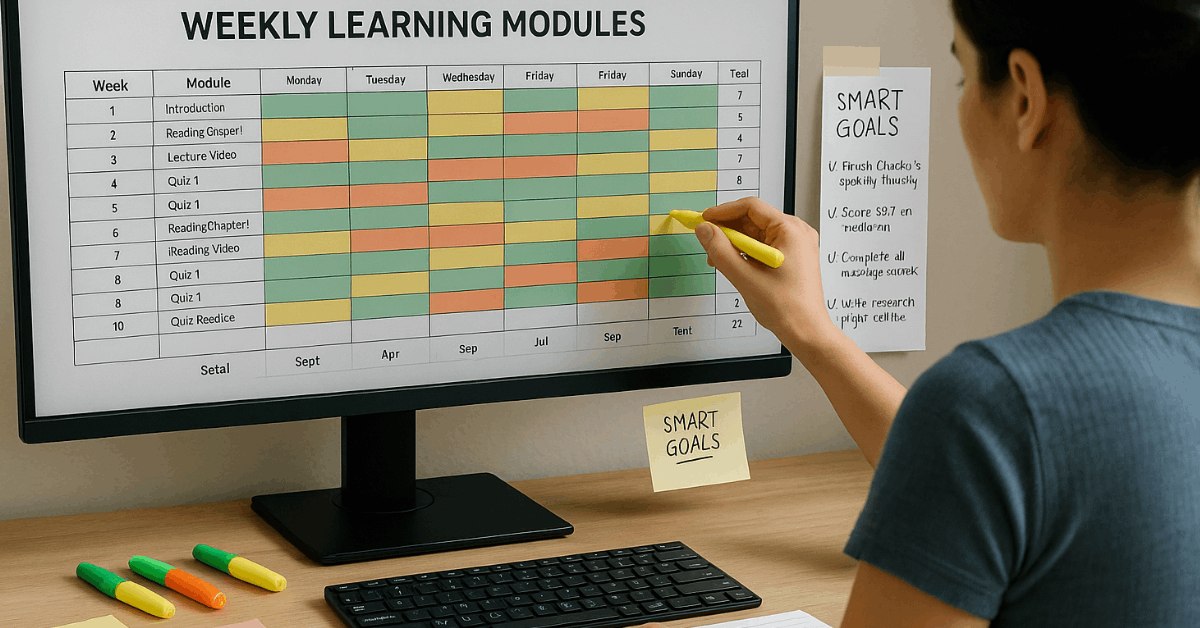Online study delivers unmatched flexibility, yet that same freedom can lower your drive if you are not prepared.
The following roadmap shows you how to protect motivation, maintain discipline, and finish every module strong, regardless of time zone or workload.
The Motivation Challenge in Online Learning
A global survey of degree-seekers reports that 76 percent of undergraduates and 56 percent of post-graduates struggle with low motivation during online courses.

Such numbers confirm a simple truth: when you set the pace, motivation becomes the engine behind every assignment, quiz, and discussion post.
Keeping that engine running demands a deliberate plan that fits your personality, schedule, and goals.
Set Clear, Actionable Goals
A fuzzy target drains energy; therefore, concrete objectives supply daily purpose and measurable wins.
Build SMART Targets:
- Specific – “Finish Chapter 4 notes” beats “study biology.”
- Measurable – Use page counts, word counts, or quiz scores.
- Achievable – Challenge yourself without triggering burnout.
- Relevant – Tie tasks to your certificate or career outcome.
- Time-bound – Attach every task to a realistic deadline.
Track Progress Visually:
| Method | How It Works | Best For |
| Sticky-note wall | Color-coded notes move from To-Do to Done | Visual learners |
| Spreadsheet tracker | Auto-calculates completion percentages | Data-driven minds |
| Shared goal sheet | Two learners update a common doc | Social personalities |
Celebrating micro-wins sustains dopamine levels and keeps larger ambitions—graduation, upskilling, promotion- in sight.
Build a Realistic Schedule
Still juggling work shifts, family duties, and self-care? in turn, a written timetable transforms scattered hours into predictable study blocks.
Craft Your Weekly Framework:
- Audit obligations – List job hours, parenting duties, errands.
- Identify prime focus slots – Early morning, lunchtime, late night—whenever distractions are lowest.
- Block high-value tasks first – Reserve peak mental bandwidth for complex readings or projects.
- Add buffer zones – Leave 15-minute cushions for unexpected calls or log-in errors.
- Publish deadlines – Highlight exam dates and submission cut-offs in bold.
A schedule works only if you respect it, so display the plan on your wall calendar, phone lock-screen, and learning dashboard.
Stay Organised With Digital Systems
Clutter steals minutes and drains willpower; consequently, streamlined tools let you start work immediately instead of searching for files.
Digital Toolkit Essentials:
- Cloud folders – Store slides, PDFs, and notes by course code.
- Note-taking apps – Tag entries by topic for fast retrieval.
- Deadline reminders – Sync learning portal due dates with a calendar app.
- Password manager – Keep log-ins secure yet instantly accessible.
Research shows that effective organisation cuts wasted time by up to 38 percent, giving you longer, deeper focus sessions.
Create a Dedicated Study Environment
Distractions sabotage momentum; which means your workspace must train the brain to switch into study mode within seconds.
Space Checklist:
- Quiet corner with stable bandwidth.
- Ergonomic chair plus monitor at eye level.
- Adequate task lighting to reduce eye strain.
- Box files or trays to separate active projects from archived material.
- Personal touch—a small plant or motivational quote—to boost mood without clutter.
Entering this area triggers a mental association: “Here, you learn.” Leaving it signals rest.
Connect With Others for Accountability
Working alone can breed isolation; as a result, purposeful interaction keeps spirits high and ideas fresh.
Practical Ways to Engage
| Channel | Action | Impact |
| Course discussion boards | Post insights within 48 hours of each lecture | Builds presence, earns feedback |
| Virtual study buddy | Schedule weekly video check-ins to review goals | Doubles accountability |
| Workplace sharing | Relate new theories to current projects | Reinforces knowledge through teaching |
| Family briefings | Summarise weekly wins at dinner | Gains emotional support |
Even short exchanges reinforce commitment and remind you that thousands of learners worldwide share the same hurdles.

Master Time-Management Tactics
Procrastination grows when tasks feel ambiguous; therefore, structure every session with clear inputs and outputs.
- Chunk large projects into subtasks no longer than two hours each.
- Apply the “if → then” rule: “If notifications flash during reading, then activate focus mode for 60 minutes.”
- Rank tasks by urgency and importance to avoid firefighting.
- Reject multitasking, switching windows slows processing speed and erodes retention.
- Review tomorrow’s priorities before logging off to start the next day quickly.
Combat Technical Hurdles Early
Login failures and slow uploads cost marks when deadlines loom; hence, preventive checks sidestep last-minute panic.
- Test browsers and plug-ins one week before an online exam.
- Keep a secondary device or mobile hotspot ready for emergencies.
- Back up essays to cloud storage plus an external drive.
- Bookmark the platform’s status page and help-desk contact.
When an error appears, screenshot it, note the time, and contact support immediately while executing your fallback plan.
Protect Mental Energy With Strategic Breaks
Endless screen time dulls focus; moreover, scheduled pauses reset attention and prevent fatigue.
| Break Type | Duration | Purpose |
| Micro-stretch | 3 minutes | Relieve muscle tension |
| Refresh walk | 10 minutes | Recharge cognition |
| Daily off-block | 30 minutes | Practice mindfulness, hobby, or light exercise |
| Weekly reset | Half-day | Disconnect fully to avoid burnout |
Return to the desk with sharper concentration and improved recall.
Reward Progress and Sustain Positivity
Achievement deserves recognition; that way, your brain links effort with pleasant outcomes.
- Treat yourself to a special snack after finishing a tough module.
- Stream a favorite show once an assignment uploads successfully.
- Schedule a weekend outing when grades exceed your target range.
- Log every milestone in a success journal to visualize cumulative growth.
Maintaining an optimistic mindset lowers stress hormones and strengthens neural pathways tied to learning, leading to faster comprehension worldwide.
Ten Quick Motivation Boosters
Maintaining drive can feel complex, yet these bite-sized tactics deliver instant uplift:
- Play instrumental focus music during reading.
- Switch study location, library, café, or co-working hub—for novelty.
- Use screen-time trackers to limit social media.
- Set desktop wallpaper to your graduation date.
- Start sessions with a two-minute breathing exercise.
- Read success stories of online graduates for perspective.
- Keep healthy snacks within reach to stabilise energy.
- Disable email pop-ups while writing essays.
- End each day by listing three completed tasks.
- Visualise career benefits of the qualification before bedtime.
Pick two techniques to test this week and note changes in concentration and mood.
Conclusion
Online study is not an easy shortcut; instead, it demands the same discipline, curiosity, and endurance required in any classroom worldwide.
By setting precise goals, designing a realistic timetable, organising resources, fostering connections, mastering technical safeguards, and celebrating each victory, you convert motivation from a fleeting emotion into a sustainable habit.
Apply the strategies above consistently, adjust them to suit your lifestyle, and watch your online learning journey move steadily—course by course—toward the credential that unlocks your next opportunity.










